
|
(1988-1992 Blue Loop Standing But Not Operating) In the mid 1970’s roller coaster designers perfected the clothoid loop
which allowed roller coasters to perform inversions with the limits of
the human body, and the looping coaster rush began with parks around the
world vying to add their own looping roller coasters as quickly and
affordably as possible.
Arrow Dynamics introduced the launch loop
roller coaster to meet the needs of parks who wanted the highly
marketable looping roller coaster without spending phenomenal sums of
money to build them and without needing the space taken by a full
circuit roller coaster.
The launch loop was a shuttle
coaster, so it had the advantage of offering guests their first ever
looping experience twice in one ride, once forward and once backward.
The design had advantages and drawbacks in
comparison to the competing design offered by Schwarzkopf, with a lower
power requirement and simpler mechanical configuration, but requiring
riders to climb many flights of stairs to board and disembark from the
ride.
Launch loops were surpassed in
design by better, full circuit coasters in the 1980’s as park guests
expected more from a ride than a simple loop.
As their popularity declined, many have
been removed and sold to smaller parks or simply scrapped.
|
|
|
||
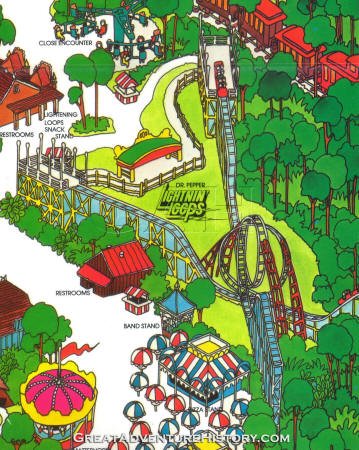 |
 |
|
 |

Lightnin’ Loops was added to Great Adventure as part of a major
investment made as part of the park’s acquisition by Six Flags.
Six Flags had hit upon a proven formula with parks that combined
the best elements of theme parks with favorite thrilling rides found at
more traditional amusement parks.
The new owners wanted to start things off in a memorable way, and
a brand new looping coaster was just the ticket.
Launch Loop coasters were being added to amusement and theme parks all
around the country, and in order to stand out Six Flags would add one
with a new twist, the world’s first interlocking loops.
Only two other coasters built by Arrow Dynamics featured
interlocking loops, the Orient Express at Worlds of Fun theme park which
would not open until 1980, and the Loch Ness Monster which would open in
1978 at Busch Gardens The Old Country.
In contrast to Lightnin’ Loops, the two coasters that followed it
were full circuit coasters and not just shuttle loops.
Lightnin’ Loops one advantage over the coasters that followed it
was that trains could be launched simultaneously so they could traverse
the loops at the same time, adding to the thrill.
Though simultaneous launches could be done, they seldom were
since the stations were so far apart and operated as separate rides.
At the time of construction, the steel coaster industry was still in its infancy, and rides were still mostly assembled component by component on site rather than shipping to the construction area in prefabricated sections, taking more time and labor to construct. Also, the steel track and structure arrived and was assembled unpainted, meaning more time was required after the steel was in place to make the ride ready for the public.   |
 |
||||||||||||||||||||||||||||||||||||||||||||||||||||||||||||||||||||||||||||||||||||||||||||||||||||||||||||||||||||||||||||||||||||||||||||||||||||||||||||||||||||||||||||||||||||
 |
 |
|||||||||||||||||||||||||||||||||||||||||||||||||||||||||||||||||||||||||||||||||||||||||||||||||||||||||||||||||||||||||||||||||||||||||||||||||||||||||||||||||||||||||||||||||||||
 |
 |
|||||||||||||||||||||||||||||||||||||||||||||||||||||||||||||||||||||||||||||||||||||||||||||||||||||||||||||||||||||||||||||||||||||||||||||||||||||||||||||||||||||||||||||||||||||
 |
 |
|||||||||||||||||||||||||||||||||||||||||||||||||||||||||||||||||||||||||||||||||||||||||||||||||||||||||||||||||||||||||||||||||||||||||||||||||||||||||||||||||||||||||||||||||||||
 |
 |
|||||||||||||||||||||||||||||||||||||||||||||||||||||||||||||||||||||||||||||||||||||||||||||||||||||||||||||||||||||||||||||||||||||||||||||||||||||||||||||||||||||||||||||||||||||
 |
 |
|||||||||||||||||||||||||||||||||||||||||||||||||||||||||||||||||||||||||||||||||||||||||||||||||||||||||||||||||||||||||||||||||||||||||||||||||||||||||||||||||||||||||||||||||||||
|
||||||||||||||||||||||||||||||||||||||||||||||||||||||||||||||||||||||||||||||||||||||||||||||||||||||||||||||||||||||||||||||||||||||||||||||||||||||||||||||||||||||||||||||||||||||
|
||||||||||||||||||||||||||||||||||||||||||||||||||||||||||||||||||||||||||||||||||||||||||||||||||||||||||||||||||||||||||||||||||||||||||||||||||||||||||||||||||||||||||||||||||||||
 |
 |
 |
||||||||||||||||||||||||||||||||||||||||||||||||||||||||||||||||||||||||||||||||||||||||||||||||||||||||||||||||||||||||||||||||||||||||||||||||||||||||||||||||||||||||||||||||||||
 |
||||||||||||||||||||||||||||||||||||||||||||||||||||||||||||||||||||||||||||||||||||||||||||||||||||||||||||||||||||||||||||||||||||||||||||||||||||||||||||||||||||||||||||||||||||||
 |
 |
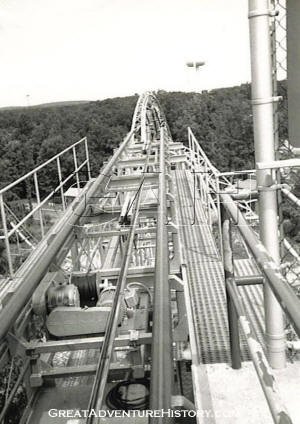 |
||||||||||||||||||||||||||||||||||||||||||||||||||||||||||||||||||||||||||||||||||||||||||||||||||||||||||||||||||||||||||||||||||||||||||||||||||||||||||||||||||||||||||||||||||||
 |
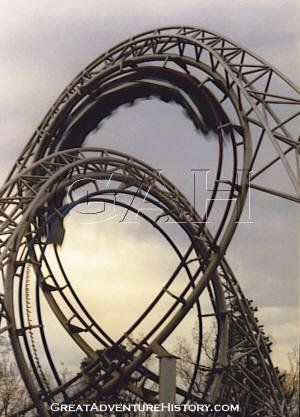 |
 |
||||||||||||||||||||||||||||||||||||||||||||||||||||||||||||||||||||||||||||||||||||||||||||||||||||||||||||||||||||||||||||||||||||||||||||||||||||||||||||||||||||||||||||||||||||
 |
 |
 |
||||||||||||||||||||||||||||||||||||||||||||||||||||||||||||||||||||||||||||||||||||||||||||||||||||||||||||||||||||||||||||||||||||||||||||||||||||||||||||||||||||||||||||||||||||
 |
 |
 |
||||||||||||||||||||||||||||||||||||||||||||||||||||||||||||||||||||||||||||||||||||||||||||||||||||||||||||||||||||||||||||||||||||||||||||||||||||||||||||||||||||||||||||||||||||
 |
 |
 |
||||||||||||||||||||||||||||||||||||||||||||||||||||||||||||||||||||||||||||||||||||||||||||||||||||||||||||||||||||||||||||||||||||||||||||||||||||||||||||||||||||||||||||||||||||
  |
Watch video of Lightnin' Loops in action: |
|||||||||||||||||||||||||||||||||||||||||||||||||||||||||||||||||||||||||||||||||||||||||||||||||||||||||||||||||||||||||||||||||||||||||||||||||||||||||||||||||||||||||||||||||||||
 |
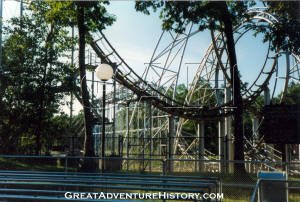 |
 |
||||||||||||||||||||||||||||||||||||||||||||||||||||||||||||||||||||||||||||||||||||||||||||||||||||||||||||||||||||||||||||||||||||||||||||||||||||||||||||||||||||||||||||||||||||
 |
 |
 |
||||||||||||||||||||||||||||||||||||||||||||||||||||||||||||||||||||||||||||||||||||||||||||||||||||||||||||||||||||||||||||||||||||||||||||||||||||||||||||||||||||||||||||||||||||
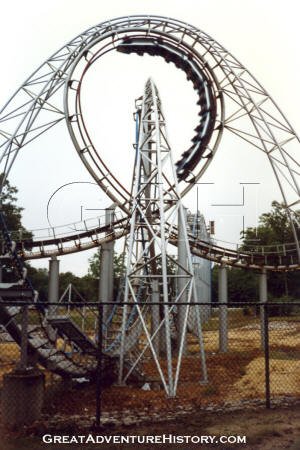 |
The ride was power by electric motors on the platforms at the ends of
the track, using a high speed winch with a steel cable to pull a catch
car behind the train, launching down the hill and into the loop at
around 45 miles per hour, giving the train enough momentum to go through
the loop and up the hill onto the opposite platform.
On the platform, the ride’s fin braking system would bring the
train to a stop and the process would reverse, with a matching catch car
pushing the coaster the opposite direction back towards the station
platform. The ride
originally strove for simultaneous launches whenever possible, but from
1983 until 1987 operators were instructed to stagger the launches to
minimize the power fluctuations for the neighboring Freefall ride.
Both ends of the ride featured platforms and stairs and operator booth,
though the far platforms were bare bones and only used to evacuate the
ride in case of an emergency. Those
far platforms were very isolated, sitting out beyond the edges of the
park’s developed area.
Both ends also had built in winches at the end of the track,
which could be used to pull the train back up the hill to the platform
in the event it saddled.
The valleys of the track also were equipped with evacuation
platforms in the event the ride got stuck.
|
  |
||||||||||||||||||||||||||||||||||||||||||||||||||||||||||||||||||||||||||||||||||||||||||||||||||||||||||||||||||||||||||||||||||||||||||||||||||||||||||||||||||||||||||||||||||||
 |
 |
|||||||||||||||||||||||||||||||||||||||||||||||||||||||||||||||||||||||||||||||||||||||||||||||||||||||||||||||||||||||||||||||||||||||||||||||||||||||||||||||||||||||||||||||||||||
 |
 |
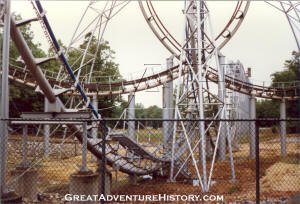 |
||||||||||||||||||||||||||||||||||||||||||||||||||||||||||||||||||||||||||||||||||||||||||||||||||||||||||||||||||||||||||||||||||||||||||||||||||||||||||||||||||||||||||||||||||||
 |
The station platforms for Lightnin’ Loops featured several flights of
stairs for the exit and entrance to the ride.
The stairs were painted red for the higher of the two loops and
blue for the lower loop.
The rails were painted in the matching red and blue colors as
well, though the trains originally were the opposite colors, with the
red train on the lower, blue track and the blue train on the upper red
track. Lightnin’ Loops was the
first ride in the park to be outfitted with airgates, which are now
standard on almost every coaster in the world.
Lighting for the rides was a simple string of chasing lights with
alternating clear and red or blue bulbs to match the rail colors.
The lights periodically chased, stopped and reversed mirroring
the motion of the trains.
The lights hung loose below the track, swagged between the cross
ties.
The ride featured a large queue area, with mirrored switchbacks leading
to the two platforms.
The two lines split right at the entrance, requiring riders to decide
which of the loops they wanted to ride before the wait began.
The wait for the ride in the early years was very long as people
wanted to experience what was then the state of the art in thrill rides.
Many days the wait time would be more than an hour for each side.
Over the seasons the trains were reconditioned and repainted with new
colors. The train on
the lower track was painted a metallic gold color and the upper track’s
train was painted black. |
 |
||||||||||||||||||||||||||||||||||||||||||||||||||||||||||||||||||||||||||||||||||||||||||||||||||||||||||||||||||||||||||||||||||||||||||||||||||||||||||||||||||||||||||||||||||||
 |
 |
|||||||||||||||||||||||||||||||||||||||||||||||||||||||||||||||||||||||||||||||||||||||||||||||||||||||||||||||||||||||||||||||||||||||||||||||||||||||||||||||||||||||||||||||||||||
 |
 |
|||||||||||||||||||||||||||||||||||||||||||||||||||||||||||||||||||||||||||||||||||||||||||||||||||||||||||||||||||||||||||||||||||||||||||||||||||||||||||||||||||||||||||||||||||||
 |
 |
|||||||||||||||||||||||||||||||||||||||||||||||||||||||||||||||||||||||||||||||||||||||||||||||||||||||||||||||||||||||||||||||||||||||||||||||||||||||||||||||||||||||||||||||||||||
 |
 |
|||||||||||||||||||||||||||||||||||||||||||||||||||||||||||||||||||||||||||||||||||||||||||||||||||||||||||||||||||||||||||||||||||||||||||||||||||||||||||||||||||||||||||||||||||||
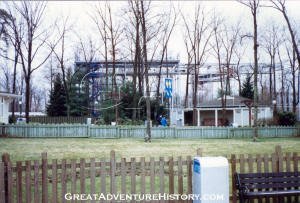 |
 |
 |
||||||||||||||||||||||||||||||||||||||||||||||||||||||||||||||||||||||||||||||||||||||||||||||||||||||||||||||||||||||||||||||||||||||||||||||||||||||||||||||||||||||||||||||||||||
|
 |
|||||||||||||||||||||||||||||||||||||||||||||||||||||||||||||||||||||||||||||||||||||||||||||||||||||||||||||||||||||||||||||||||||||||||||||||||||||||||||||||||||||||||||||||||||||
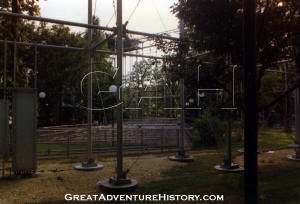 |
||||||||||||||||||||||||||||||||||||||||||||||||||||||||||||||||||||||||||||||||||||||||||||||||||||||||||||||||||||||||||||||||||||||||||||||||||||||||||||||||||||||||||||||||||||||
 |
||||||||||||||||||||||||||||||||||||||||||||||||||||||||||||||||||||||||||||||||||||||||||||||||||||||||||||||||||||||||||||||||||||||||||||||||||||||||||||||||||||||||||||||||||||||
 |
  |
 |
||||||||||||||||||||||||||||||||||||||||||||||||||||||||||||||||||||||||||||||||||||||||||||||||||||||||||||||||||||||||||||||||||||||||||||||||||||||||||||||||||||||||||||||||||||
 |

In June of 1987, a passenger tried to board the train after the operator
had started the dispatch, which could not be stopped once the motor was
in motion. The rider
was thrown from the train and killed in the fall from the upper loop.
The ride was closed for months after the accident as safety
modifications were made to the ride’s control systems and the restraint
system. As a result,
throughout the park rides were modified adding additional safety
features to many attractions including new “enable dispatch” buttons
which required both the ride’s attendants and the ride’s operator to
hold down a button confirming the ride was ready to start.
The shoulder harnesses of Lightnin’ Loops were modified with
large handles being added, preventing guests from sitting in front of
the harness. This
would become a standard feature on all Arrow Dynamics coasters built for
Six Flags ever since.
After the modifications, only the upper loop reopened, with the lower
loop not receiving the modifications and its entrance being permanently
blocked. The second track
wasn’t needed with the decreased popularity of the ride, as well as the
diminished park attendance. |
 |
||||||||||||||||||||||||||||||||||||||||||||||||||||||||||||||||||||||||||||||||||||||||||||||||||||||||||||||||||||||||||||||||||||||||||||||||||||||||||||||||||||||||||||||||||||
 |
 |
|||||||||||||||||||||||||||||||||||||||||||||||||||||||||||||||||||||||||||||||||||||||||||||||||||||||||||||||||||||||||||||||||||||||||||||||||||||||||||||||||||||||||||||||||||||
 |
 |
 |
||||||||||||||||||||||||||||||||||||||||||||||||||||||||||||||||||||||||||||||||||||||||||||||||||||||||||||||||||||||||||||||||||||||||||||||||||||||||||||||||||||||||||||||||||||
 |
 |
 |
||||||||||||||||||||||||||||||||||||||||||||||||||||||||||||||||||||||||||||||||||||||||||||||||||||||||||||||||||||||||||||||||||||||||||||||||||||||||||||||||||||||||||||||||||||
 |
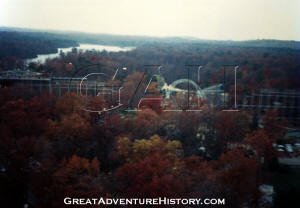 |
 |
||||||||||||||||||||||||||||||||||||||||||||||||||||||||||||||||||||||||||||||||||||||||||||||||||||||||||||||||||||||||||||||||||||||||||||||||||||||||||||||||||||||||||||||||||||
 |
 |
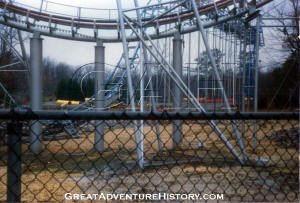 |
||||||||||||||||||||||||||||||||||||||||||||||||||||||||||||||||||||||||||||||||||||||||||||||||||||||||||||||||||||||||||||||||||||||||||||||||||||||||||||||||||||||||||||||||||||
 |
 |
 |
||||||||||||||||||||||||||||||||||||||||||||||||||||||||||||||||||||||||||||||||||||||||||||||||||||||||||||||||||||||||||||||||||||||||||||||||||||||||||||||||||||||||||||||||||||
 |
 |
 |
||||||||||||||||||||||||||||||||||||||||||||||||||||||||||||||||||||||||||||||||||||||||||||||||||||||||||||||||||||||||||||||||||||||||||||||||||||||||||||||||||||||||||||||||||||
  |
 |
  |
||||||||||||||||||||||||||||||||||||||||||||||||||||||||||||||||||||||||||||||||||||||||||||||||||||||||||||||||||||||||||||||||||||||||||||||||||||||||||||||||||||||||||||||||||||
 |
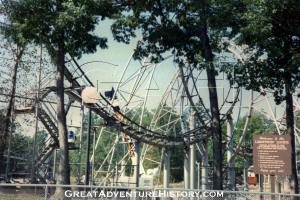 |
 |
||||||||||||||||||||||||||||||||||||||||||||||||||||||||||||||||||||||||||||||||||||||||||||||||||||||||||||||||||||||||||||||||||||||||||||||||||||||||||||||||||||||||||||||||||||
 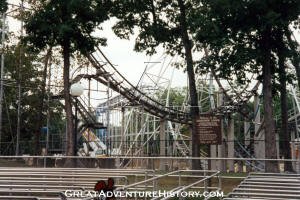 |
 |
  |
||||||||||||||||||||||||||||||||||||||||||||||||||||||||||||||||||||||||||||||||||||||||||||||||||||||||||||||||||||||||||||||||||||||||||||||||||||||||||||||||||||||||||||||||||||
 |
In the fall of 1992 disassembly of the ride began as Time Warner, then
owners of Six Flags made the decision to add Batman: The Ride after the
huge success of the ride at Six Flags Great America.
What had been a state of the art ride in 1978, was replaced by
the new state of the art for 1992.
The ride was removed, with the original intention to relocate one of the
two loops to the vacant site which had been home to the Ultra Twister.
The long, straight site adjacent to Rolling Thunder would have
fit the ride well with minimal work required.
Plans called for the ride to be called “Lightnin’ Loop” which
would have been a good companion to Rolling Thunder.
The plan to move the ride never materialized, and instead the two tracks
were sold off to other parks.
The lower loop was purchased by Frontier City in Oklahoma City
where it was reassembled and opened in 1993 as Diamond Back.
Frontier City’s owners had just purchased the Wild Adventures
park in Largo, Maryland and bought the upper loop there where it was
reassembled and opened in 1993.
The owners of those parks went on to become Premier Parks, and
would eventually end up purchasing Six Flags from Time Warner, and Wild
World would eventually take on the name Six Flags America.
|
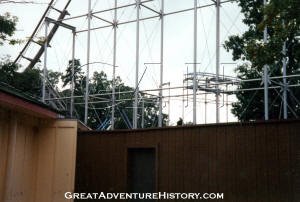 |
||||||||||||||||||||||||||||||||||||||||||||||||||||||||||||||||||||||||||||||||||||||||||||||||||||||||||||||||||||||||||||||||||||||||||||||||||||||||||||||||||||||||||||||||||||
 |
  |
|||||||||||||||||||||||||||||||||||||||||||||||||||||||||||||||||||||||||||||||||||||||||||||||||||||||||||||||||||||||||||||||||||||||||||||||||||||||||||||||||||||||||||||||||||||
 |
 |
|||||||||||||||||||||||||||||||||||||||||||||||||||||||||||||||||||||||||||||||||||||||||||||||||||||||||||||||||||||||||||||||||||||||||||||||||||||||||||||||||||||||||||||||||||||
 |
 |
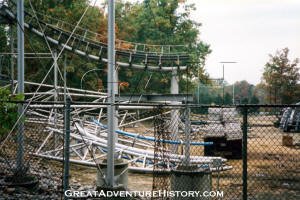 |
||||||||||||||||||||||||||||||||||||||||||||||||||||||||||||||||||||||||||||||||||||||||||||||||||||||||||||||||||||||||||||||||||||||||||||||||||||||||||||||||||||||||||||||||||||
  |
 |
 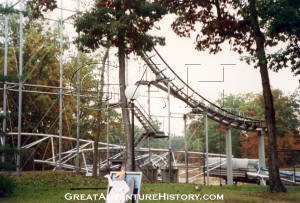 |
||||||||||||||||||||||||||||||||||||||||||||||||||||||||||||||||||||||||||||||||||||||||||||||||||||||||||||||||||||||||||||||||||||||||||||||||||||||||||||||||||||||||||||||||||||
 |
 |
 |
||||||||||||||||||||||||||||||||||||||||||||||||||||||||||||||||||||||||||||||||||||||||||||||||||||||||||||||||||||||||||||||||||||||||||||||||||||||||||||||||||||||||||||||||||||
  |
 |
  |
||||||||||||||||||||||||||||||||||||||||||||||||||||||||||||||||||||||||||||||||||||||||||||||||||||||||||||||||||||||||||||||||||||||||||||||||||||||||||||||||||||||||||||||||||||
 |
 |
 |
||||||||||||||||||||||||||||||||||||||||||||||||||||||||||||||||||||||||||||||||||||||||||||||||||||||||||||||||||||||||||||||||||||||||||||||||||||||||||||||||||||||||||||||||||||
 |
 |
 |
||||||||||||||||||||||||||||||||||||||||||||||||||||||||||||||||||||||||||||||||||||||||||||||||||||||||||||||||||||||||||||||||||||||||||||||||||||||||||||||||||||||||||||||||||||
 |
 |
 |
||||||||||||||||||||||||||||||||||||||||||||||||||||||||||||||||||||||||||||||||||||||||||||||||||||||||||||||||||||||||||||||||||||||||||||||||||||||||||||||||||||||||||||||||||||
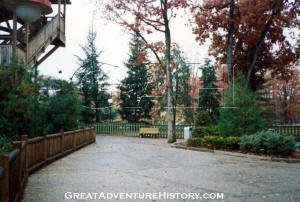 |
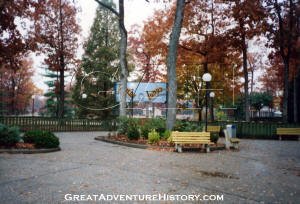 |
 |
||||||||||||||||||||||||||||||||||||||||||||||||||||||||||||||||||||||||||||||||||||||||||||||||||||||||||||||||||||||||||||||||||||||||||||||||||||||||||||||||||||||||||||||||||||
  |
 |
  |
||||||||||||||||||||||||||||||||||||||||||||||||||||||||||||||||||||||||||||||||||||||||||||||||||||||||||||||||||||||||||||||||||||||||||||||||||||||||||||||||||||||||||||||||||||
 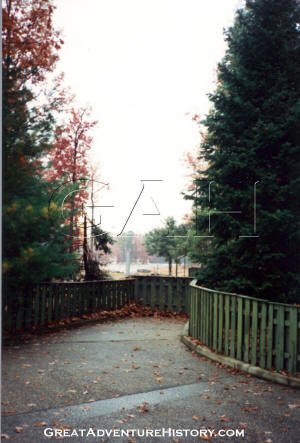 |
 
Today, Diamond Back still operates at Frontier City.
The Python ran at Wild World (later known as Adventure World)
until 1998, when it was removed as part of the park’s makeover into Six
Flags America. The
coaster sat in storage from 1999 through 2005, when the steel structure
was scrapped. |
  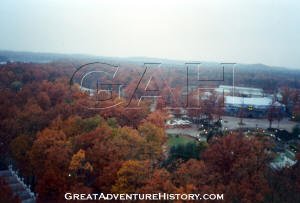 |
||||||||||||||||||||||||||||||||||||||||||||||||||||||||||||||||||||||||||||||||||||||||||||||||||||||||||||||||||||||||||||||||||||||||||||||||||||||||||||||||||||||||||||||||||||
 |
 |
 |
||||||||||||||||||||||||||||||||||||||||||||||||||||||||||||||||||||||||||||||||||||||||||||||||||||||||||||||||||||||||||||||||||||||||||||||||||||||||||||||||||||||||||||||||||||
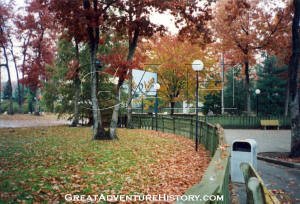 |
 |
 |
||||||||||||||||||||||||||||||||||||||||||||||||||||||||||||||||||||||||||||||||||||||||||||||||||||||||||||||||||||||||||||||||||||||||||||||||||||||||||||||||||||||||||||||||||||
|
||||||||||||||||||||||||||||||||||||||||||||||||||||||||||||||||||||||||||||||||||||||||||||||||||||||||||||||||||||||||||||||||||||||||||||||||||||||||||||||||||||||||||||||||||||||
| Lightnin' Loops Postcards and Souvenirs | ||||||||||||||||||||||||||||||||||||||||||||||||||||||||||||||||||||||||||||||||||||||||||||||||||||||||||||||||||||||||||||||||||||||||||||||||||||||||||||||||||||||||||||||||||||||
 |
 |
 |
||||||||||||||||||||||||||||||||||||||||||||||||||||||||||||||||||||||||||||||||||||||||||||||||||||||||||||||||||||||||||||||||||||||||||||||||||||||||||||||||||||||||||||||||||||
| Postcards | ||||||||||||||||||||||||||||||||||||||||||||||||||||||||||||||||||||||||||||||||||||||||||||||||||||||||||||||||||||||||||||||||||||||||||||||||||||||||||||||||||||||||||||||||||||||
|
||||||||||||||||||||||||||||||||||||||||||||||||||||||||||||||||||||||||||||||||||||||||||||||||||||||||||||||||||||||||||||||||||||||||||||||||||||||||||||||||||||||||||||||||||||||
 |
 |
 |
||||||||||||||||||||||||||||||||||||||||||||||||||||||||||||||||||||||||||||||||||||||||||||||||||||||||||||||||||||||||||||||||||||||||||||||||||||||||||||||||||||||||||||||||||||
| T-Shirt | Button | Patch | ||||||||||||||||||||||||||||||||||||||||||||||||||||||||||||||||||||||||||||||||||||||||||||||||||||||||||||||||||||||||||||||||||||||||||||||||||||||||||||||||||||||||||||||||||||
 |
 |
 |